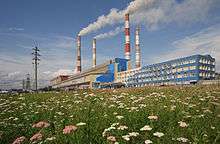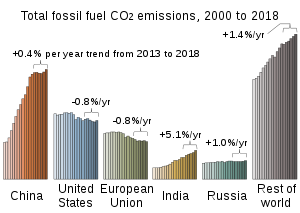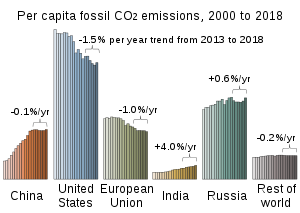Greenhouse gas emissions by Russia
Greenhouse gas emissions by Russia are the 4th largest in the world and derive mostly from fossil fuels. Russia emits about 1600 megatonnes (Mt) CO2eq of greenhouse gases each year;[1] about 5% of world emissions[2] and about 11 tons per person. Cutting greenhouse gas emissions, and therefore air pollution in Russia, would have health benefits greater than the cost.[3]

Greenhouse gas sources

2 emissions in China and the rest of world have eclipsed the output of the United States and Europe.[4]

2155 Mt of CO
2 was emitted in 2017 but 578 Mt was reabsorbed by land use, land-use change, and forestry (LULUCF).[1]
Russia must submit its inventory of 2018 emissions to the UNFCCC by 15 April 2020, and so on for each calendar year.[5]
Energy
In 2017 Russia's energy sector, which under IPCC guidelines includes fuel for transport, emitted almost 80% of the country's greenhouse gases.[1] Industrial Processes and Product Use (IPPU) emitted over 10%. The largest emitters are energy industries—mainly electricity generation—followed by fugitive emissions from fuels, and then transport.[1]
Electricity generation
Coal fired power stations
Gas fired power stations
Gas fired power stations are a major source.[6]
Transport fuel
Home energy
Industry
Cement
Iron and steel
Agriculture
In 2017, agriculture emitted 6% of Russia's greenhouse gases.[1]
Waste
In 2017, waste emitted 4% of the country's greenhouse gases.[1]
Energy efficiency
Planning and forecasts
International comparison of mitigation targets
Reducing greenhouse gas emissions and increasing absorption (climate change mitigation)
Energy
Economics
As Russia has no carbon tax or emissions trading[8] it could be vulnerable to future carbon tariffs imposed by the EU,[9][10] or other export partners.[11]
Carbon sinks
Carbon sinks, which in Russia consist mainly of forests, offset about a quarter of national emissions in 2017.[1]
Hydrofluorocarbons
Buildings
Transport
Cars
Economics
Co-benefits
Politics
Access to data
Data is scarce and out of date.[12]
See also
Notes
References
- "Summary of GHG Emissions for Russian Federation" (PDF). UNFCCC.
- "BROWN TO GREEN: THE G20 TRANSITION TO A LOW-CARBON ECONOMY | 2017" (PDF). Climate Transparency.
- Sampedro, Jon; Smith, Steven J.; Arto, Iñaki; González-Eguino, Mikel; Markandya, Anil; Mulvaney, Kathleen M.; Pizarro-Irizar, Cristina; Van Dingenen, Rita (2020-03-01). "Health co-benefits and mitigation costs as per the Paris Agreement under different technological pathways for energy supply". Environment International. 136: 105513. doi:10.1016/j.envint.2020.105513. ISSN 0160-4120.
- Friedlingstein et al. 2019, Table 7.
- "Reporting requirements | UNFCCC". unfccc.int. Retrieved 2019-10-08.
- IntelliNews, Ben Aris for bne (2019-09-30). "The Cost of Carbon in Russia". The Moscow Times. Retrieved 2019-10-29.
- Page, Michael Le. "Russia has declared a state of emergency over Siberian wildfires". New Scientist. Retrieved 2019-10-29.
- "Taxing Energy Use 2019: Country Note – Russia" (PDF). OECD.
- "Carbon tariffs are EU's secret weapon in trade battle". Daily Telegraph. 5 June 2018. Archived from the original on 6 May 2019. Retrieved 24 February 2019.
- "Pollution Costs at Decade High Squeeze Industry, Coal in Europe". Bloomberg. 24 August 2018. Archived from the original on 11 June 2019. Retrieved 24 February 2019.
- "Carbon Tariffs: A Climate Necessity?". Kluwer Regulating for Globalization. Archived from the original on 11 October 2018. Retrieved 11 October 2018.
- Israel, Ron (2019-06-06). "Current Russian Data on Greenhouse Gas Emissions is Scarce and Significantly Out-of-Date". Climate Scorecard. Retrieved 2019-10-29.
Sources
- "2020 National Inventory Report".
- "Russian Greenhouse Gas Inventory 1990 - 2018 common reporting format (CRF) tables" (RUS_2020_2018_13042020_230905.xlsx). April 2020.
External links
- Live carbon emissions from electricity generation in European Russia and Ural
- Live carbon emissions from electricity generation in Siberia
- Greenhouse Gas Inventory to 2017 in downloadable spreadsheets
- National Greenhouse Gas Inventory to 2017 Report
- Status report on the annual inventory of Russia for 2016
- Greenhouse Gas Inventory Data - Flexible Queries Annex I Parties
- NDC Registry (only a flag so far)
- Climate Action Tracker: Russia
- Climate Watch: Russia